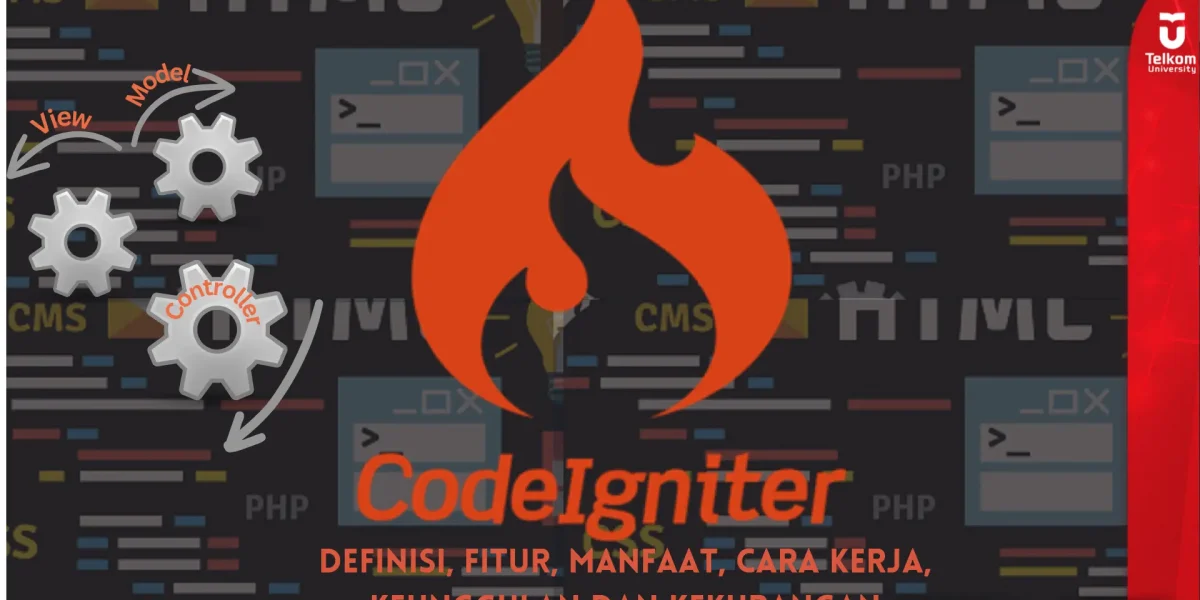Codeigniter: Definition, Features, Benefits, How it Works, Advantages and Disadvantages
A framework, or also called a framework in Indonesian, is a group of functions, procedures, classes and instructions combined in a special structure. The main goal of the framework is to make developers’ work easier in programming activities.
Generally, frameworks serve as effective tools for developers, allowing them to program more efficiently, saving time and reducing effort. By using a framework, developers do not need to create functions or classes from scratch.
Developers’ use of frameworks is generally driven by several reasons, including speeding up and simplifying the web application development process. In addition, frameworks make maintenance easier because they provide existing patterns, and are usually equipped with general facilities such as validation, ORM (Object-Relational Mapping), pagination, support for multiple databases, and so on.
Although there are various types of frameworks that can be used by developers, one of the most popular is CodeIgniter. CodeIgniter is known as a framework that is very suitable for use by corporate web development teams, especially for those who have limited budgets. For more information about CodeIgniter, you can check out the detailed review in the provided article.
Understanding Codeigniter
CodeIgniter is a framework that is popular in the world of application and web development using the Model-View-Controller (MVC) concept. As an open-source platform, CodeIgniter is the main choice for developers working with the PHP programming language. Using CodeIgniter aims to speed up and simplify the project development process.
Introduced in 2006 by Rick Ellis, CodeIgniter boasts a wider range of libraries than some other frameworks. The specialty of CodeIgniter lies in its lightweight nature, so it does not place a large burden on website resources. In addition, as an open-source framework, CodeIgniter can be accessed and downloaded for free by developers.
CodeIgniter adopts the MVC model, an approach that is very suitable for designing dynamic applications or websites. The MVC concept is used to separate main components into several parts, forming an effective pattern during the application development process.
CodeIgniter Features
CodeIgniter is known as the first choice of developers thanks to its superior performance and comprehensive features that make development tasks easier. Here are the main features that differentiate CodeIgniter.
1. Model-View-Controller (MVC)
This feature is a favorite among developers and makes CodeIgniter a highly regarded framework. Model-View-Controller (MVC) is an industry standard practice that separates data, logic, and presentation in web applications.
2. Built-in Library
This feature allows users to find various solutions about programming, including books, tutorials, and usage guides related to CodeIgniter. CodeIgniter developers have access to complete documentation explaining how the application system works as well as other information about PHP development.
In this built-in library, there are tutorials or instructions that cover common problems that have been faced by other developers and the solutions found, so they can be a reference for other users.
3. Very Light
In an era where application loading speed is a priority, CodeIgniter delivers loading times of less than one second after installation. With a fast response of less than 50 milliseconds, CodeIgniter is faster than some other frameworks.
4. Compact Source Code
The small size of the source code is an advantage, simplifying the implementation and updating of application systems. CodeIgniter has a source code of approximately only 2 MB, making it easier for users to understand CodeIgniter and how it works.
Benefits of Codeigniter
When you want to build a professional, modern, and efficient website, CodeIgniter is one of the best choices. Not only does it have excellent performance and features, CodeIgniter users can also gain a number of significant additional benefits.
Here are some of the benefits that CodeIgniter provides, as explained by Seasia Info Tech:
1. Automatically Track Bugs
CodeIgniter has the ability to automatically track and identify bugs, making it easier for users in the debugging process and improving the overall quality of the developed website.
2. Design and System Adjustments
Users have the freedom to customize the CodeIgniter design and system according to their specific needs. This flexibility makes it possible to build a website that fits the user’s vision and goals.
3. Guaranteed Security
CodeIgniter offers a high level of security, providing security guarantees for websites developed with this framework. This helps protect websites from potential attacks and security threats.
4. Easy Data Migration
This framework allows users to easily migrate data from one server to another. This capability is very useful when users need to transfer or manage data across different server environments.
5. Improved SEO Ranking
CodeIgniter provides features that make it easy for users to improve their website’s SEO ranking. With the strong support of this framework, users can optimize their content to be better indexed by search engines and gain better visibility online.
How Codeigniter Works
CodeIgniter is a framework that adopts the Model-View-Controller (MVC) pattern. MVC, which stands for Model-view-controller, can be explained as follows: when you search for certain information, the controller will respond to your request, then present the information sought if it is available.
As a simple example, imagine if you want to search for information with id=3. At that time, the controller will respond to your request, and then ask the Model to retrieve the data associated with id=3. The model will return the data to the controller. The model will return the data to the controller. The results will be displayed in your browser.
CodeIgniter follows the following workflow:
- Index.php: Acts as the first file in the program that is read by the system.
- Router: Examine HTTP requests to determine what action the program should take.
- Cache Files: If there is a “cache file” in the program, the file will be sent directly to the browser. Having a cache file can speed up the process of opening a website.
- Security: Before the controller file is fully loaded, HTTP requests and data sent by the user will be filtered through CodeIgniter’s security facilities.
- Controller: Opens model files, core libraries, helpers, and all the resources needed in the program.
Advantages of CodeIgniter
CodeIgniter provides a number of advantages that may not be found in other frameworks. Here are some of the benefits and advantages that CodeIgniter offers:
- Easy to Learn: CodeIgniter is a very easy framework to learn, especially if you already know PHP. You can master CodeIgniter in no time to build and develop applications.
- Small Size: CodeIgniter framework has a very small size, around 2MB. This small size makes it easier to run and update CodeIgniter. Compared to other types of frameworks, CodeIgniter is clearly friendlier to device storage space.
- Can Be Modified: CodeIgniter is equipped with a library that contains lots of help and instructions. If you don’t find what you’re looking for, you can easily add your own help, hints, or libraries.
- Very Fast: Users generally prefer software that is able to process processes quickly. CodeIgniter is present as a super fast framework, where the process of loading and executing commands can be processed in less than 50 milliseconds.
- Flexible: CodeIgniter is equipped with a number of advanced features and components that stand alone without interdependence. This allows users to upgrade and fix certain problems easily.
Disadvantages of Codeigniter
Among the several advantages that CodeIgniter has, there are several disadvantages that programmers must anticipate if they want to use this framework. Here are some of the disadvantages that CodeIgniter has:
- Although there are various libraries available, CodeIgniter is not designed for large-scale website development or enterprise needs.
- CodeIgniter still has significant flexibility in writing code, such as the ability to freely add files.
- This framework does not fully reflect the Model-View-Controller (MVC) concept correctly, for example using the echo command which can still be done directly in the Controller file.

